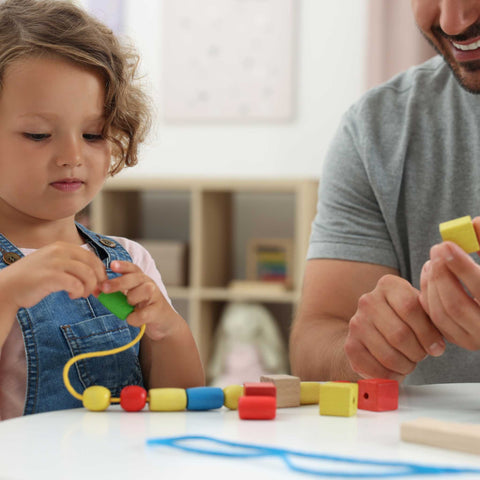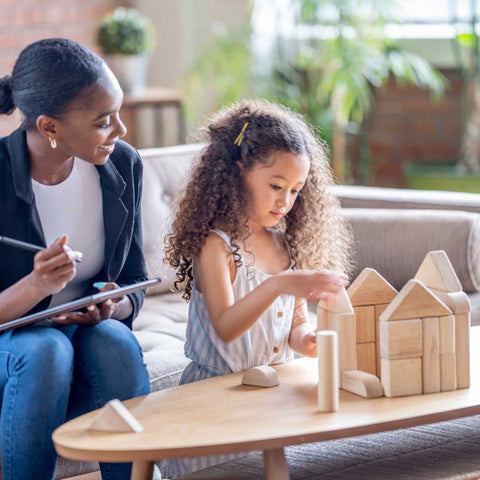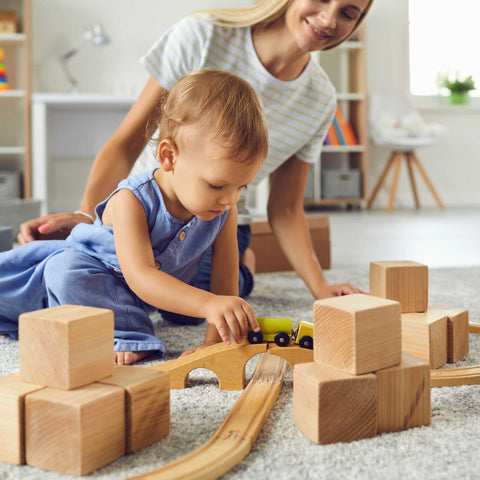Play is not just a fun pastime for children; it's a crucial aspect of their development journey. Through play, children learn to navigate the world around them, develop essential skills, and build meaningful connections with others. From the earliest stages of infancy to the later years of childhood, play shapes children's physical, cognitive, and social-emotional well-being.
In this blog, we aim to delve into the multifaceted role of play in child development.
By understanding the various ways play contributes to different aspects of growth, parents and caregivers can better support their children's holistic development. From enhancing motor skills to fostering creativity and emotional intelligence, play serves as a foundation for lifelong learning and well-being.
Our goal is to highlight the significance of play as an integral component of raising healthy and happy children. By recognizing the value of play and incorporating it into daily routines, families can nurture children's development in diverse ways. Through this exploration, we aim to empower parents and caregivers with insights and strategies to foster rich play experiences that promote optimal development in children.
Types of Play: Nurturing Development Through Diverse Activities
Understanding Different Types of Play

Play manifests in various forms, each offering unique benefits to children's development. Imaginative play, also known as pretend play, allows children to explore different roles and scenarios, fostering creativity and problem-solving skills. Constructive play involves building and creating, promoting spatial awareness, fine motor skills, and logical thinking.
Physical play, including activities like running, jumping, and climbing, contributes to physical health, coordination, and strength.
Importance of Each Type of Play
Child development is significantly influenced by play, which encourages the development of symbolic representation, cognitive skills, spatial reasoning, and physical fitness, thus laying the foundation for a healthy lifestyle.
Examples of Play Activities
Examples of imaginative play activities include playing dress-up, pretending to be superheroes, or hosting a tea party with stuffed animals. Constructive play activities may involve building with blocks, assembling puzzles, or crafting with clay.
Physical play encompasses activities such as playing tag, riding bikes, or swinging on a playground. By incorporating a variety of play activities into children's daily routines, parents and caregivers can support their holistic development across multiple domains.
Physical Development Through Play: Fostering Gross Motor Skills and Health
Enhancing Gross Motor Skills and Coordination
Physical play serves as a cornerstone for children's physical development, promoting the refinement of gross motor skills, strength, and coordination. Activities like running, skipping, and playing catch allow children to practice balance, agility, and spatial awareness. As they engage in active play, they learn to control their movements and develop the muscle strength necessary for various physical tasks.
Benefits of Outdoor Play

Outdoor play offers unique benefits for children's physical health and well-being. Exposure to natural elements like sunshine and fresh air supports overall health and immune function. Furthermore, outdoor environments provide ample space for children to engage in dynamic activities that challenge their physical abilities.
Whether it's climbing trees, exploring nature trails, or playing on playground equipment, outdoor play encourages movement and fosters a sense of freedom and exploration.
Encouraging Physical Development Activities
Opportunities for physical development are abundant in children's daily routines, facilitated by a variety of activities. These include simple games, playground equipment, structured sports, dance classes, and martial arts lessons, all aimed at enhancing cardiovascular fitness, coordination, and motor skills.
Cognitive Development Through Play: Nurturing Problem-Solving and Creativity
Stimulating Cognitive Skills Through Play
Play serves as a powerful tool for stimulating cognitive development in children, fostering essential skills such as problem-solving, creativity, and decision-making. During play, children encounter various challenges and scenarios that require them to think critically and adapt their strategies. Whether they're constructing a tower with building blocks or navigating through an obstacle course in the backyard, children engage in problem-solving processes that help them understand cause-and-effect relationships and develop logical reasoning skills.
Enhancing Language and Communication Skills
Play narratives, a crucial aspect of children's development, are enriched by imaginative play. These narratives, involving role-playing activities like pretending to be superheroes, help children develop language skills, vocabulary, grammar, and syntax. They also foster cooperative play, enabling children to negotiate roles and collaborate on imaginative scenarios.
Activities for Cognitive Development
Play is a crucial component in children's cognitive development, fostering a sense of accomplishment and sharpening cognitive skills. Activities like puzzles, games, pretend play, and storytelling stimulate imagination, language comprehension, and narrative skills.
Caregivers can create enriching experiences that promote cognitive growth and development in children by incorporating these activities into play routines.
Social-Emotional Development Through Play: Fostering Empathy and Teamwork
Cultivating Social Skills and Emotional Regulation
Play serves as a rich environment for children to develop crucial social-emotional skills, including empathy, emotional regulation, and interpersonal communication. Through play interactions with peers and caregivers, children learn to navigate social dynamics, understand others' perspectives, and express their emotions in constructive ways. For example, during pretend play scenarios, children often take on roles that require them to understand and respond to the feelings and needs of others, fostering empathy and compassion.
Nurturing Teamwork and Conflict Resolution
Play encourages teamwork and negotiation skills in children, allowing them to share resources and work towards common goals. These collaborative experiences develop essential social competencies, preparing them for positive relationships and future social situations.
Promoting Social-Emotional Development Through Activities
Role-playing activities, involving simulated scenarios, foster social-emotional development in children. These activities encourage children to explore social roles, practice interacting, and learn cooperation, reciprocity, and respect. Group games and team sports also foster essential social skills and friendships.
Play-Based Learning: A Foundation for Early Education
Understanding Play-Based Learning
Play-based learning is a social educational approach that emphasizes hands-on, child-directed experiences, fostering curiosity, creativity, problem-solving skills, and social, emotional, and cognitive development in children. It encourages active involvement in the learning process, promoting meaningful exploration and discovery.
Supporting Academic Skills Development
Play plays a crucial role in developing foundational academic skills in young children, including literacy and numeracy. Engaging in imaginative play scenarios and math-focused activities helps children develop early literacy skills through storytelling, role-playing, and vocabulary expansion. These activities provide a playful and meaningful context for children to develop these skills.
Integrating Educational Objectives with Playfulness
Educational activities are crucial for children's development. These activities integrate educational objectives with playful experiences, making learning enjoyable and engaging.
For instance, sensory bins and art activities allow children to explore letter recognition and phonemic awareness. By incorporating educational content into these activities, educators can create meaningful learning experiences that cater to children's interests, strengths, and developmental needs.
Parental Involvement in Play: Fostering Meaningful Connections
Facilitating and Participating in Play
Parents play a crucial role in nurturing their child's development through play. By actively engaging in their child's play experiences, parents can strengthen their bond, promote learning, and support their child's overall well-being. Through play, parents have the opportunity to observe their child's interests, strengths, and areas for growth, allowing for meaningful interactions and shared experiences that contribute to positive development.
Creating a Play-Friendly Environment
Creating a play-friendly environment both at home and in the community is essential for encouraging children's exploration, creativity, and social interactions. At home, parents can designate a designated play area with a variety of toys, games, and materials that cater to their child's interests and developmental needs.
Additionally, incorporating outdoor play spaces and community resources such as parks, playgrounds, and libraries provides opportunities for children to engage in diverse play experiences and interact with peers.
Actively Engaging with Children During Playtime
Engaging children in activities like building blocks, board games, and pretend play can foster a positive and nurturing environment. Parents can provide encouragement, support, and social skills, fostering a strong bond with their child.
Benefits of Unstructured Play: Nurturing Creativity and Independence
Exploring and Expressing Freely
Unstructured play, also known as free play, offers children the freedom to explore, create, and express themselves without predetermined rules or objectives. During unstructured play, children have the opportunity to follow their curiosity, make choices, and engage in activities that align with their interests and imagination. This type of play encourages self-directed learning, problem-solving, and decision-making skills as children navigate their play environment and interact with various stimuli.
Fostering Creativity through Boredom
Children's creativity can be boosted by boredom, as it allows them to explore their surroundings and think creatively. This approach fosters resourcefulness and innovation, despite the potential for overstimulation by structured activities.
Incorporating Unstructured Play into Daily Routines
Integrating unstructured play into children's daily routines is essential for promoting holistic development and well-being. Parents can encourage unstructured play by providing ample time and space for open-ended exploration and creative expression.
This may involve setting aside unstructured playtime each day, allowing children to choose their activities and play materials freely, and minimizing adult-directed or overly scheduled activities. Outdoor play, imaginative play, and free play with open-ended toys such as blocks, art supplies, and dress-up costumes are excellent ways to promote unstructured play and foster children's creativity, independence, and self-confidence.
Supporting Play in Different Settings: Fostering Playfulness Everywhere

Promoting Play in Educational Settings
Children's school experience is enhanced by incorporating play-based activities into lessons and group activities. These activities foster collaboration, problem-solving skills, and encourage children to explore their interests, enhancing their overall development and learning experience.
Integrating Play into Healthcare Settings
Play is an essential tool in healthcare settings, supporting children's emotional well-being and alleviating stress. Healthcare professionals can create play-friendly environments, promoting positive interactions and empowering children to express concerns. This enhances care quality and positive outcomes for children and families.
Creating Play Opportunities in Community Spaces
Children in the community are provided with numerous opportunities to engage in play and social interaction, fostering a sense of belonging and fostering a healthy, well-rounded environment that fosters their overall development.
Nurturing Child Development Through Play

Emphasizing the Importance of Play
Play is not just a pastime; it's a fundamental aspect of child development that impacts physical, cognitive, and social-emotional well-being. Through play, children learn about the world around them, develop essential skills, and build strong foundations for future success.
Whether it's engaging in physical activities, exploring imaginative worlds, or interacting with others, play provides valuable opportunities for growth and learning.
Supporting and Encouraging Playful Exploration
As parents and caregivers, there are countless ways to support and encourage play in children's lives. From providing access to diverse play materials and environments to actively participating in play activities, adults play a crucial role in nurturing children's natural curiosity and creativity. By embracing playfulness, parents can foster strong parent-child bonds, promote positive interactions, and create lasting memories with their children.
Prioritizing Play for Healthy and Happy Children
In a world filled with academic pressures and busy schedules, it's essential to prioritize play as an integral part of raising healthy and happy children. By recognizing the value of play and incorporating it into daily routines, families can promote holistic child development and lay the groundwork for lifelong success. Let's join together in embracing the power of play and ensuring that every child has the opportunity to learn, grow, and thrive through playful exploration and discovery.
Leave your comments below; we love to hear from you! And don't forget to follow Easy Peasie for more veggie info and convo on YouTube, Facebook, and Instagram! ~ThePeas













